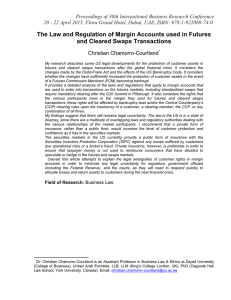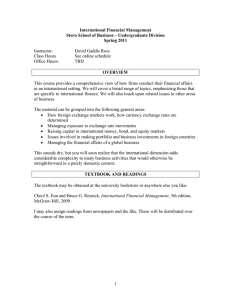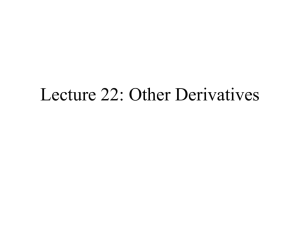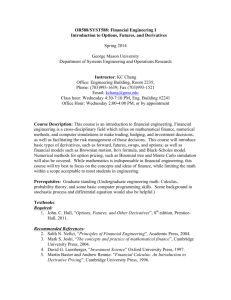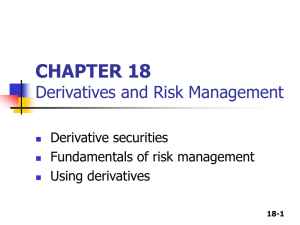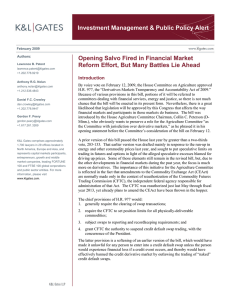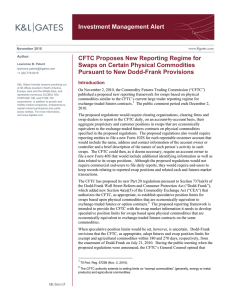K&L Gates Global Government Solutions 2011: Annual Outlook An Excerpt From: January 2011
advertisement
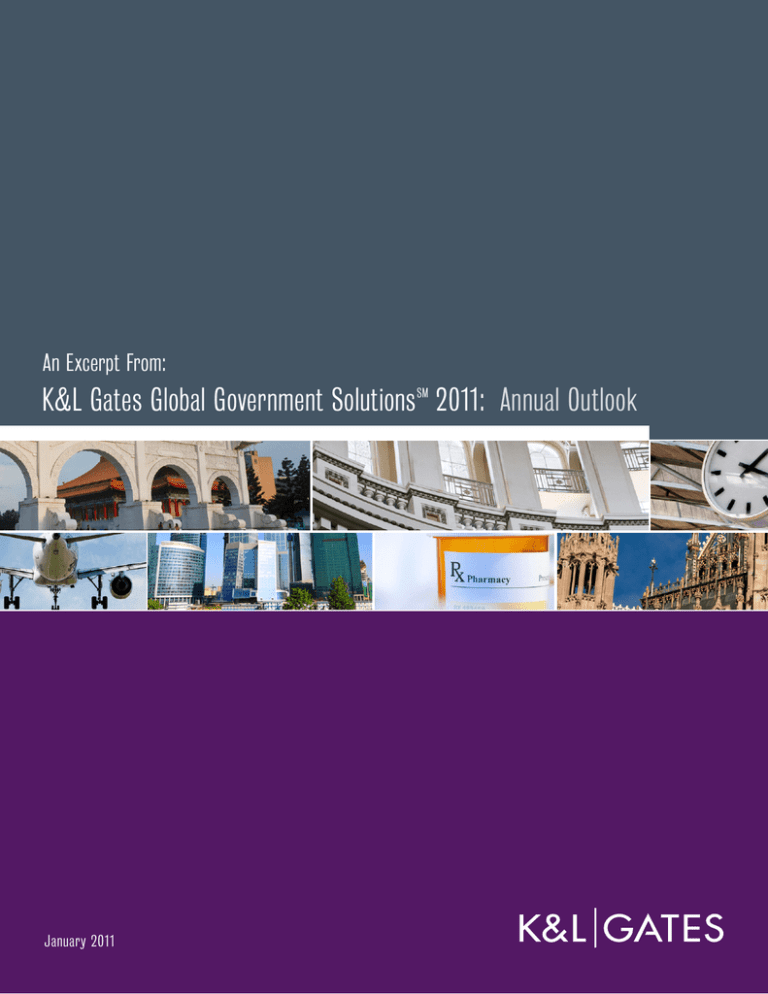
An Excerpt From: K&L Gates Global Government Solutions SM 2011: Annual Outlook January 2011 Financial Services CFTC’s Dodd-Frank Rulemaking on Protections for Customer Funds For Cleared Swaps Confronts Significant Market Structure Issues This regime obviously puts the funds of non-defaulting customers in jeopardy, and is sometimes referred to as “fellowcustomer risk.” The Commodity Futures Trading Commission (“CFTC”) considers one of its highest priorities to be the protection of the funds that customers deposit with their futures commission merchants (“FCMs”) for their futures contracts. The current regulatory framework for protection of futures customer margin deposits has been in place for decades. As a result of the Dodd-Frank Wall Street Reform and Consumer Protection Act (“Dodd-Frank”), however, the CFTC is now grappling with whether it should adopt a fundamentally different regime for the protection of customer funds deposited as collateral for the new trading in cleared swaps. Some opponents of a futures-style mutualization of risk for swap customer collateral have argued that Section 724 of Dodd-Frank, which added new CEA Section 4d(f)(6), does not permit it. Section 4d(f)(6) is identical to CEA Section 4d(b) except for the absence of one letter “s”. Section 4d(b) makes it unlawful for a DCO to treat the funds of futures customers “as belonging to the depositing [FCM] or any person other than the customers of the [FCM].” (Emphasis added.) New Section 4d(f) (6) is the same for swaps except that the term “swaps customer” (in the singular) is used instead of “customers.” Opponents of fellow-customer risk for swaps contend that use of the singular prohibits one customer’s funds from being treated as belonging to any other person, including any other customer. The scant legislative history on the subject is not definitive. A different regime could establish significantly greater protection for swap customer funds in the event of a commodity broker bankruptcy, but might also impose significantly higher costs for both swap customers and FCMs. The outcome will affect all parties to those swaps that Dodd-Frank requires to be cleared, such as swaps involving pension plans and other financial entities. The CFTC issued an Advance Notice of Proposed Rulemaking seeking comment on various approaches to this issue; the comment period closed on January 18, 2011. Following review of those comments, the CFTC is expected to formulate proposed regulations by the end of the first quarter of 2011, and to publish those for further comment. The existing framework applicable to customer funds for futures trading mutualizes the risk of any customer default on a futures contract across all customers of the FCM. Each futures clearinghouse— or, as they are referred to by statute, “derivatives clearing organization” (“DCO”)—establishes the minimum levels of futures margin that an FCM must collect from its customers and post with the DCO. Section 4d(b) of the Commodity Exchange Act (“CEA”) permits an FCM to maintain those customer margin funds in the FCM’s omnibus customer account at the DCO. If a futures customer defaults on a futures contract and the FCM carrying that customer’s account cannot cover the defaulting customer’s obligations on its futures contracts, the DCO may use any or all of the collateral in the FCM’s customer omnibus account—including the assets of the FCM’s other customers—to meet the defaulting customer’s obligations. Acknowledging arguments on all sides, the CFTC’s Advance Notice posits four alternative schemes for the protection of customer funds. The first is “full physical segregation” of each swap customer’s funds at the FCM, the DCO and any other depository, which would eliminate fellow-customer risk. A second alternative, K&L Gates Global Government Solutions SM 2011 Annual Outlook 13 Financial Services referred to as “legal segregation with commingling,” would require collateral requirements for each swap customer to be calculated on an individual basis, but the DCO could maintain the collateral in a customer omnibus account. Both of these alternatives would prohibit a DCO from using the collateral of a non-defaulting customer to satisfy the obligations of a defaulting customer. The third alternative, described as “moving customers to the back of the waterfall,” would be similar to the second alternative, except that the DCO could use the collateral attributable to a nondefaulting customer in case of a default, but only after it first used its own capital and the assets in the DCO’s guarantee fund established from contributions of its clearing members. The last alternative, referred to as the “baseline model,” is the current framework for futures. The CFTC has requested comments on the costs and operational procedures related to each of these models. One DCO has estimated that margin 14 requirements for clearing members could increase by 60 percent if swaps are treated differently from futures, with these increased costs being passed on to customers. The CFTC also requested comment on the moral hazard that may be associated with providing greater protection for swap customer funds and thereby lessening the concern a customer may have with the risk management practices of the FCM it chooses. This leads to questions of whether and how a swap customer could even assess the risk posed by fellow customers and the efficacy of an FCM’s risk management practices. There is at least a concern that the resolution of these issues could affect futures customers as well. The director of the CFTC’s Division of Clearing and Intermediary Oversight stated that, if a system for swaps were permitted that differed from the baseline model, the futures system might need to be conformed because it would not be feasible to operate differing systems K&L Gates Global Government Solutions SM 2011 Annual Outlook for swaps and futures. CFTC Chairman Gensler, however, has questioned whether that would be the case. Requiring the clearing of standardized swaps through a central counterparty is one of the hallmarks of Dodd-Frank, which is intended to reduce systemic risk in the U.S. financial markets and banking system. However, centralized clearing of swaps also introduces the potential of fellow-customer risk, and a fundamental and controversial policy issue for the CFTC. Given the potential impact of the CFTC’s ultimate decision, continued intense debate and scrutiny undoubtedly will continue before the issue is resolved. Lawrence B. Patent (Washington, D.C.) lawrence.patent@klgates.com Charles R. Mills (Washington, D.C.) charles.mills@klgates.com Anchorage Los Angeles San Diego Austin Miami Beijing Berlin Moscow San Francisco Boston Newark Seattle Charlotte New York Shanghai Chicago Dallas Orange County Singapore Dubai Palo Alto Fort Worth Paris Spokane/Coeur d’Alene Frankfurt Pittsburgh Taipei Tokyo Harrisburg Portland Raleigh Hong Kong London Research Triangle Park Warsaw Washington, D.C. K&L Gates includes lawyers practicing out of 36 offices located in North America, Europe, Asia and the Middle East, and represents numerous GLOBAL 500, FORTUNE 100, and FTSE 100 corporations, in addition to growth and middle market companies, entrepreneurs, capital market participants and public sector entities. For more information, visit www.klgates.com. K&L Gates comprises multiple affiliated entities: a limited liability partnership with the full name K&L Gates LLP qualified in Delaware and maintaining offices throughout the United States, in Berlin and Frankfurt, Germany, in Beijing (K&L Gates LLP Beijing Representative Office), in Dubai, U.A.E., in Shanghai (K&L Gates LLP Shanghai Representative Office), in Tokyo, and in Singapore; a limited liability partnership (also named K&L Gates LLP) incorporated in England and maintaining offices in London and Paris; a Taiwan general partnership (K&L Gates) maintaining an office in Taipei; a Hong Kong general partnership (K&L Gates, Solicitors) maintaining an office in Hong Kong; a Polish limited partnership (K&L Gates Jamka sp.k.) maintaining an office in Warsaw; and a Delaware limited liability company (K&L Gates Holdings, LLC) maintaining an office in Moscow. K&L Gates maintains appropriate registrations in the jurisdictions in which its offices are located. A list of the partners or members in each entity is available for inspection at any K&L Gates office. This publication is for informational purposes and does not contain or convey legal advice. The information herein should not be used or relied upon in regard to any particular facts or circumstances without first consulting a lawyer. ©2011 K&L Gates LLP. All Rights Reserved.
